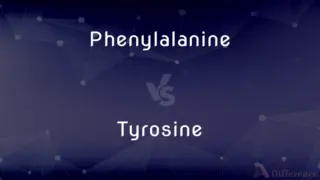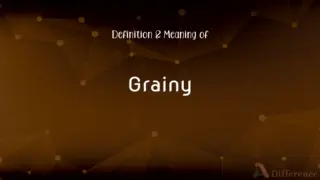Druid vs. Warlock — What's the Difference?
By Tayyaba Rehman & Urooj Arif — Updated on May 1, 2024
Druids are nature-focused spellcasters in fantasy settings, often harnessing elemental and animal powers, while warlocks gain their abilities through pacts with otherworldly entities, focusing on darker, more destructive magic.

Difference Between Druid and Warlock
Table of Contents
ADVERTISEMENT
Key Differences
Druids, often depicted in fantasy genres and games, are deeply connected to nature, drawing their magical powers from the earth, flora, fauna, and elemental forces. This connection enables them to cast spells that heal, transform, or summon natural allies. Warlocks, on the other hand, are known for their dealings with demons, eldritch beings, or other supernatural sources, from whom they derive their power in exchange for fealty or service, which often grants them abilities focused on curses, summons, and manipulations of magical energies.
A druid's magic is typically restorative and supportive, aiming to maintain balance and harmony within the natural world. They might heal allies, grow plants instantly, or change into animals. In contrast, a warlock's magic is more aggressive and manipulative, capable of summoning demonic entities, casting hexes, or using forbidden knowledge to overwhelm opponents.
Druids are often portrayed as guardians of sacred natural sites and keepers of ancient wisdom related to the earth and its cycles. Their abilities reflect a symbiotic relationship with nature, promoting growth and renewal. Warlocks, however, may be seen as seekers of power at any cost, often exploring taboo magic and making pacts that require them to push ethical boundaries for more power.
The social perceptions in fantasy worlds usually cast druids as revered or respected figures within communities that live close to nature, acting as advisers or healers. Warlocks might be viewed with suspicion or fear, given their associations with dangerous powers and the potential for corruption their paths entail.
Druids and warlocks differ significantly in their thematic elements and narrative roles. While druids embody themes of nature, balance, and growth, warlocks explore themes of ambition, sacrifice, and the moral costs of power.
ADVERTISEMENT
Comparison Chart
Source of Power
Nature and elemental forces
Pacts with supernatural entities
Typical Abilities
Healing, transformations, summoning natural allies
Summoning demons, casting hexes, using dark magic
Role in Fantasy
Guardians of nature, healers
Seekers of forbidden knowledge
Magic Type
Restorative, supportive
Aggressive, manipulative
Perception
Respected, integral to communities
Suspect, potentially feared
Compare with Definitions
Druid
Known for their ability to shape-shift into animals.
The druid transformed into an eagle to scout the mountain pass.
Warlock
Employs dark magic, often involving curses and necromancy.
The warlock cast a curse that spread misery throughout the town.
Druid
A magic user in fantasy settings who derives powers from nature.
The druid called upon the spirits of the forest to shield them from harm.
Warlock
Might summon demonic entities as part of their magic.
With a word, the warlock summoned a fiend to fight by his side.
Druid
Connected with elemental magic, controlling water, fire, earth, or air.
The druid summoned a rainstorm to quench the fire threatening the village.
Warlock
A spellcaster who gains power through deals with otherworldly entities.
The warlock drew his power from a pact with a shadowy demon.
Druid
Often serves as a healer or protector of the natural world.
The druid healed the wounded bear, using herbs and magical chants.
Warlock
Associated with seeking forbidden knowledge.
The warlock's relentless pursuit of forbidden spells led him into dark territories.
Druid
Acts as a steward of natural balance.
As a druid, she maintained the balance between human encroachments and nature.
Warlock
Often viewed with suspicion or fear due to their sources of power.
Villagers avoided the warlock, fearful of his dark affiliations.
Druid
A druid was a member of the high-ranking class in ancient Celtic cultures. Druids were religious leaders as well as legal authorities, adjudicators, lorekeepers, medical professionals and political advisors.
Warlock
A warlock is a male practitioner of witchcraft.
Druid
A member of an order of priests in ancient Gaul and Britain who appear in Welsh and Irish legend as prophets and sorcerers.
Warlock
A person, especially a man, claiming or popularly believed to practice sorcery or witchcraft.
Druid
One of an order of priests among certain groups of Celts before the adoption of Abrahamic religions.
Warlock
A male magic-user; a male witch.
Druid
One of an order of priests which in ancient times existed among certain branches of the Celtic race, especially among the Gauls and Britons.
Warlock
A male witch; a wizard; a sprite; an imp.
It was Eyvind Kallda's crewOf warlocks blue,With their caps of darkness hooded!
Druid
A member of a social and benevolent order, founded in London in 1781, and professedly based on the traditions of the ancient Druids. Lodges or groves of the society are established in other countries.
Warlock
Of or pertaining to a warlock or warlock; impish.
Thou shalt win the warlock fight.
Druid
A pre-Christian priest among the Celts of ancient Gaul and Britain and Ireland
Warlock
A male witch or demon
Common Curiosities
Can druids and warlocks both use magic to summon allies?
Yes, but while druids summon natural allies like animals or elemental spirits, warlocks summon demonic or supernatural entities.
Why might a warlock be feared or distrusted?
Due to their pacts with potentially malevolent entities and their use of dark, often harmful magic.
What distinguishes a druid from a warlock in fantasy?
Druids draw power from nature and focus on healing and protection, whereas warlocks obtain their powers from pacts with otherworldly beings, often using darker, more aggressive magic.
Do druids and warlocks have common enemies?
They might, especially in settings where both confront forces that threaten the natural or supernatural balance, though their methods and motivations differ greatly.
What are typical roles of druids in fantasy settings?
Druids often act as guardians of nature, healers, and advisers in communities that value the natural world.
Can druids use offensive magic?
Yes, but it is typically in defense of nature or their allies, using the forces of nature itself.
What is the significance of a druid's shape-shifting ability?
It symbolizes their deep connection with nature and enhances their versatility and adaptability in protecting it.
What are the consequences of a warlock breaking a pact?
Consequences can be severe, potentially including loss of power, curse afflictions, or direct retribution from the entity.
How do warlocks gain new powers?
Through deeper pacts or by delving into forbidden knowledge and spells, often at great personal risk.
Are all warlocks evil in fantasy genres?
Not necessarily; their morality can vary widely depending on their choices and the nature of their pacts.
How are druids viewed by other magical practitioners?
Typically with respect, especially by those who also value balance and the preservation of nature.
What might drive someone to become a warlock?
Often, ambition, desperation, or the desire for knowledge or power that can't be gained through other means.
What challenges do warlocks face due to their powers?
They must navigate the demands of their patrons and the ethical dilemmas posed by their magic.
Do druids work alone or in groups?
They can work either way but often are found in groups or circles that help manage and protect natural sites.
Can a druid become corrupted?
Yes, if they misuse their powers or severely disrupt the balance they vow to protect, leading to potential corruption or loss of abilities.
Share Your Discovery

Previous Comparison
Phenylalanine vs. Tyrosine
Next Comparison
Chapel vs. ChappelAuthor Spotlight
Written by
Tayyaba RehmanTayyaba Rehman is a distinguished writer, currently serving as a primary contributor to askdifference.com. As a researcher in semantics and etymology, Tayyaba's passion for the complexity of languages and their distinctions has found a perfect home on the platform. Tayyaba delves into the intricacies of language, distinguishing between commonly confused words and phrases, thereby providing clarity for readers worldwide.
Co-written by
Urooj ArifUrooj is a skilled content writer at Ask Difference, known for her exceptional ability to simplify complex topics into engaging and informative content. With a passion for research and a flair for clear, concise writing, she consistently delivers articles that resonate with our diverse audience.











































